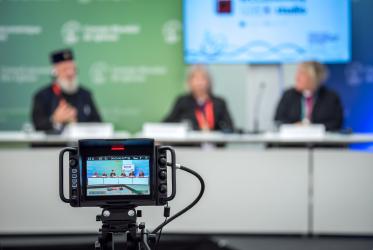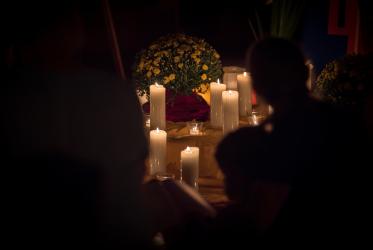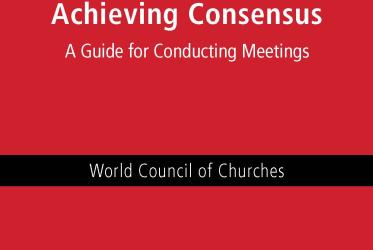The Executive Committee has considered carefully the following applications for membership, which are submitted to the Central Committee for action.
I. Member churches
1. Evangelical Baptist Church of Angola
(Igreja Evangélica Baptista em Angola)
In 1878 the Baptist Mission Society (UK) began working in Angola. During the years 1961-1974, known as the time of exile, most Baptist Christians took refuge in Congo. Two years after the independence of Angola, in 1977, the first General Assembly took place and the Evangelical Baptist Church became autonomous. Its Confession of Faith reads: "We believe that the Scriptures teach that there is a living and true God, infinite and intelligent spirit, supreme creator and judge of heaven and earth, glorious in holiness and worthy of all praise, trust and love, existing in three Persons in unity and diversity, the Father, the Son and the Holy Spirit, equal in all divine perfection, fulfilling distinct functions in accomplishing the great work of redemption". The church practises the sacraments of Baptism (believers Baptism by immersion) and Holy Communion. It is organised according to the Baptist tradition. The supreme governing body is the General Assembly. There are 300 local congregations in 8 of the 18 provinces of the country, with a total of 90 000 baptized believers and more than 200 000 members attending Sunday school (statistics 2001). The church is served by 77 pastors (5 of whom are women) and about 150 other full time workers. It has its own theological seminary in Luanda. It runs 4 clinics, a number of primary schools, 4 agricultural projects, a centre for street children and 2 vocational training centres.
The first inquiry about membership was received in 2001, but the first discussions go back to 1995 on the occasion of a staff visit to Angola. At that time there was still an anti-ecumenical majority in the church. On 22nd November 2001 the Executive Committee of the Church took the decision to apply and expressed agreement with the Basis of the WCC. The church is a member of the Council of Christian Churches in Angola and of the Baptist World Alliance.
In October 2003 the Rev. Dr Konrad Raiser, then General Secretary of the WCC and Rev. Dr André Karamaga met with the leadership of the Church on the occasion of an official visit to Angola. Their report concludes with the hope that the application of the Evangelical Baptist Church of Angola could be approved by the Central Committee in February 2005 (report available).
Proposed action: The Executive Committee recommends to the Central Committee that the Evangelical Baptist Church of Angola be received as a member church belonging to the fellowship of the World Council of Churches.
2. The African Church (Nigeria)
The African Church is an African Instituted Church founded in 1901. Its mission statement reads: "The African Church receives and accepts the Holy Bible as the standard of its faith. She also accepts the Old Testament and the New Testament as being canonical, and sufficient for salvation. She accepts and believes in the Fatherhood of God and the Holy Trinity". The church practices the sacraments of Baptism and Holy Communion. Its doctrine and liturgy are close to the Anglican tradition. It has a spiritual head, the Primate, who is also the head of the clergy, and a Lay president who is the head of the laity. Any major decision affecting the church is always taken by both the clergy and the laity. The highest governing body is the General Conference. The church has over 100,000 communicant members in 715 parishes which are grouped in 29 dioceses spread over Nigeria, and served by 552 clergy. Since 1983 clergy are trained at the African Church College of Theology which since 1992 has been affiliated with the University of Ibadan. The church runs 3 schools, 2 hospitals and some social centres and development projects.
The first inquiry about membership was made informally before the Harare assembly. In May 1999 the General Conference decided to apply and expressed agreement with the Basis of the WCC. Motivations for joining the WCC are: sharing in the fellowship, benefiting from it for the development of its human, theological and educational resources, contributing to the ecumenical movement, e.g. from its experiences in mission and evangelism, and serving as a link between mainline' churches and African Instituted churches. The church is a member of the Christian Council of Nigeria, the Christian Association of Nigeria and the All Africa Conference of Churches.
The African Church was visited in September 2001 by a WCC delegation composed of Bishop E. Renz, WCC President, H.G. Bishop Suriel of the Coptic Orthodox Church, Ms Idah Njobvu of the Reformed Church in Zambia and member of Central Committee and Fr. Kwame Labi, WCC staff. The delegation reported positively on its findings and the members stated their support for the application for membership (report available). The Christian Council of Nigeria has also given its support.
Proposed action: The Executive Committee recommends to the Central Committee that The African Church (Nigeria) be received as a member church belonging to the fellowship of the World Council of Churches.
3. Methodist Church in Indonesia
The Methodist Church in Indonesia came into being as a result of missionary work in North Sumatra of the Methodist Church in America, which began in 1904. The church became autonomous in 1964. From North Sumatra it has spread to other parts of the island and of the country (Java in particular). It is organised according to the Methodist tradition. The supreme governing body is the General Conference. The church has currently 119,000 members in 469 congregations grouped in 12 districts and 2 annual conferences. There are 232 ordained pastors. Theological training takes place in two Seminaries. The church ordains women (almost half of the students in the Seminaries are women). The priorities of the church are in the areas of mission and evangelism, education (48 elementary schools, 40 junior and 22 senior high schools, 1 University and 1 Academy), urban rural ministry, youth and women. Education has played a very central role in the life and history of the Methodist Church in Indonesia and continues to be its main ministry in the society. Almost each local congregation has its school. In the Medan District there are more school children (24,000) than church members (17,000).
The first inquiry about WCC membership was made in 1991. As a founding member of the Council (later: Communion) of Churches in Indonesia the Methodist Church had assumed that it was already a WCC member. For unknown reasons the inquiry was not followed up. A new application was made in March 2002, and the Council of Bishops has expressed agreement with the Basis of the WCC. The main motivation for joining the WCC is the desire to participate fully in the ecumenical movement, not only in Indonesia and Asia but also at the global level. The Methodist Church in Indonesia is a member of the Christian Conference of Asia and the World Methodist Council.
A WCC delegation visited the church in June 2003. The delegation was composed of Mrs Frieda Mangunsong of the Protestant Christian Batak Church and member of Central Committee, Rev. Richard Daulay, Associate General Secretary of the Communion of Churches in Indonesia and Mr. Hubert van Beek, WCC staff. In their report they express their conviction that the Methodist Church in Indonesia belongs to the ecumenical family and wishes to be an active participant, and recommend unanimously its reception as a member church of the WCC (report available).
Proposed action: The Executive Committee recommends to the Central Committee that the Methodist Church in Indonesia be received as a member church belonging to the fellowship of the World Council of Churches.
4. Baptist Convention of Haiti
(Convention Baptiste de Haïti)
The Baptist Convention of Haiti is a grouping of local Baptist churches from various missionary backgrounds, including the American Baptist Churches and the Southern Baptist Convention. It became an autonomous body in 1964. According to its Statement of Faith the Baptist Convention of Haiti believes in the Holy Scriptures as the sole authority in matters of faith, the Holy Trinity, the personal regeneration of the believer by the Holy Spirit, the purification from all sin through the blood of Christ, the resurrection and imminent return of Jesus Christ and the resurrection of the dead. The member churches of the Convention practice the sacraments of Baptism (believers baptism by immersion) and Holy Communion. The Convention is organised according to the Baptist tradition. The highest governing body is the General Assembly at which all the local churches are represented. The total number of baptized members is 80,000 in 101 local churches served by 107 pastors. The first woman pastor was ordained five years ago. The Convention has a University with a theological faculty, a conference centre, a hospital and opthamological clinic, two secondary schools and a youth centre.
The letter of application stating the agreement with the Basis of the WCC was received in May 2000. The application for membership was a direct result of the visit of the General Secretary to Haiti earlier that month. The main motivation for joining the WCC is the desire of the CBH to be open to other churches, to experience unity in a context of diversity and mutual respect and to be part of a space in which exchanges take place in a spirit of tolerance. Haiti has been evangelized by fundamentalists. The CBH shares in this conservative heritage. It is involved in an intentional and on-going effort of formation and education to promote openness among its members and pastors. The Baptist Convention of Haiti is a member of the Protestant Federation of Haiti, of the Council of Evangelical Churches of Haiti and of the Caribbean Baptist Fellowship. It is applying for membership with the Caribbean Conference of Churches.
A WCC delegation composed of Rev. Jeffrey McKenzie of the Jamaica Baptist Union and member of Central Committee, Rev. Bienné Lamerique, Vice-president of the Protestant Federation of Haiti and Mr. Hubert van Beek, WCC staff, visited the Baptist Convention of Haiti in November 2003. The delegation recommends warmly that the CBH be received as a member church of the WCC (report available). It also proposes that a fraternal relationship be developed between the Baptist Convention of Haiti and the Jamaica Baptist Union, as two churches of the same confession in neighbouring countries.
Proposed action: The Executive Committee recommends to the Central Committee that the Baptist Convention of Haiti be received as a member church belonging to the fellowship of the World Council of Churches.
5. Protestant Evangelical Church of Guinea
(Eglise protestante évangélique de Guinée)
The church grew out of the work of the Christian and Missionary Alliance, an evangelical mission body that belongs to the holiness tradition of American Methodism. The missionaries came from neighbouring Sierra Leone. They founded the PECG in 1918. The church became autonomous in 1962. It is today entirely under the responsibility of Guinean leadership and is also financially self-supporting. The PECG has 65,000 members, of whom 38,000 are baptized. The church practices a baptism of confession (minimum age of twelve years). It confesses the triune God, Father, Son and Holy Spirit and Jesus Christ as only Saviour, and believes in the authority of the Bible. Holy Communion is celebrated every first Sunday of the month. The PECG is a church belonging to the evangelical tradition with its emphasis on the sinful nature of the human being and the need for personal salvation in Christ. But the leadership is aware that the church needs a broader understanding of the gospel for its witness in the Guinean society, which is still suffering from the long period of isolation under Sekou Touré.
The highest governing body of the PECG is the general assembly. The church has 560 congregations served by 310 pastors and has its own Biblical Institute for theological training. There are no women pastors yet but the church is not opposed to it. In the social field the PECG runs 20 nursery, 15 primary and 11 secondary schools, 4 health clinics and some rural development projects. The church has also actively participated in work with refugees in the border area with Sierra Leone, and has recently started working on HIV/AIDS. It has good relationships with other churches in Guinea. Together with the Roman Catholic Church and the small Anglican Church the PECG has formed the Christian Council of Guinea. It is also a member of the Association of Evangelical Churches and Missions in Guinea and of the Inter-religious Council, an important body in a majority Muslim country (85% of the 7.5 million population is Muslim, 5.6% Roman Catholic and 1.5% Evangelical).
The first contact with the WCC was established in 2003, on the occasion of a visit of Central Committee member Mrs. Jeannette Aneyé from Ivory Coast to Guinea. The initiative to apply for membership came from the current president of the church Rev. Elie Feindouno and was approved by the general assembly in February 2004 which expressed its agreement with the Basis of the WCC. The main motivation is to be able to learn from other churches and to train church workers for the many new tasks the church is facing, especially urban ministry and work with children.
The PECG was visited in March 2004 by Mrs Jeannette Aneyé and Mr. Hubert van Beek, who had meetings with the members of the Executive Committee as well as other committees and staff. The question of membership contribution and the new criteria for membership were discussed with the leadership. The PECG is not yet a member of the AACC for the simple reason that it did not know about its existence. Informed by the delegation, the leaders decided to establish contact with the AACC in view of applying for membership. The delegation warmly recommends that the PECG be received as member of the WCC.
Proposed action : The Executive Committee recommends to the Central Committee that the Protestant Evangelical Church of Guinea be received as a member church belonging to the fellowship of the World Council of Churches.
6. Protestant church in the Netherlands
On 1 May 2004 three WCC member churches in the Netherlands - the Netherlands Reformed Church, the Reformed Churches in the Netherlands and the Evangelical Lutheran Church in the Kingdom of the Netherlands - united to form the Protestant Church in the Netherlands. That church is now requesting membership in continuation of the membership of the three former member churches.
Proposed action : The Executive Committee recommends to the Central Committee that the Protestant Church in the Netherlands be received as a member church belonging to the fellowship of the World Council of Churches.
7. Moravian Church British Province and EFBU
The European Continental Province of the Moravian Church and the Moravian Church British Province, both members of the World Council of Churches, have applied for joint membership as the Moravian Church British Province and EFBU.
Proposed action : The Executive Committee recommends to the Central Committee that the Moravian Church British Province and EFBU be received as a member church belonging to the fellowship of the World Council of Churches.
II. Associate member churches
1. Association of Evangelical Reformed Churches of Burkina Faso
(Association des Eglises évangéliques réformées du Burkina Faso)
The Association is a grouping of local churches (parishes) located mainly in the northern part of Burkina Faso and in the capital Ouagadougou which are the fruit of evangelism work of Rev. Kinda Lazare, a pastor who separated from the Assemblies of God (Pentecostal) in 1977. The Association was officially founded in 1986. Pastor Kinda studied at the Theological Institute of Porto Novo (Bénin) where he got acquainted with the reformed-Presbyterian tradition. He and his co-workers have undertaken evangelism work in remote rural areas and most of the church members are first generation Christians. The parishes are established among the poorest sector of the population in this Sahel region where people subsist on one harvest of mil or sorgho per year, in very harsh and precarious conditions. The Association tries to assist the peasants with digging wells, installing water pumps, setting up cereal banks, building schools and clinics, a small orphanage etc. Rev. Kinda has been able to build relationships with several ecumenical agencies which are providing some support for these projects.
The AERCB recognizes the sovereign authority of the Word of God incarnate in Jesus Christ and revealed by the Holy Spirit in the canonical books of the Old and New Testament, confessed in the Apostolic Creed, the Ecumenical Creeds and the Confessions of Faith of the Reformation.
The Association counts currently nine churches and three centres of evangelism which will also become local churches. Each parish has a pastor and a parish council. In future the local churches will be grouped in consistories and regional synods. The general synod composed of delegates from the regions acts as the general assembly of the Association. The general assembly on 8 February 2000 decided to apply for WCC membership, expressing its agreement with the Basis. The Association is already a member of the All Africa Conference of Churches and the World Alliance of Reformed Churches. It is not part of the only inter-church organisation of Burkina Faso, the Federation of Evangelical Churches and Missions.
Mrs Jeannette Aneyé, member of Central Committee and Mr. Hubert van Beek visited the Association in February 2004 and had an intensive exposure to some of the local churches. The Association is truly a church of the poor. Its strength is that it is witnessing the gospel among the poor in word and action. It has a weakness in the sense that the leadership seems to be almost entirely depending on one gifted person, Rev. Kinda who is the founder and president. There is also some uncertainty about the total membership of the Association. The official figure given in the application is 38,887 members. This is also the number recorded with the WARC. During the visit several different, lower numbers were mentioned. The delegation also noted the difficult relationship of the Association with the Federation of Evangelical Churches and Missions in Burkina Faso. On the other hand, the Association is the only church grouping in the country that seeks to be connected with the ecumenical movement, in Africa and globally. Taking into account these considerations and the fact that the WCC has no member churches in Burkina Faso, the delegation recommends that the Association be received as an associate member church of the WCC. The question of membership contribution and the new criteria for membership have been discussed with Rev. Kinda.
Proposed action : The Executive Committee recommends to the Central Committee that the Association of Evangelical Reformed Churches in Burkina Faso be received as an associate member church belonging to the fellowship of the World Council of Churches.
2. Presbyterian Church of Colombia
(Iglesia Presbiteriana De Colombia)
The Presbyterian Church of Colombia (IPC), a fully Spanish speaking church counting today ca. 12-15,000 baptized members, was founded by missionaries coming from the USA in 1856. Its mother church is the Presbyterian Church (USA), Louisville, Kentucky, USA, with which the IPC keeps close and fluid relations.
Education is one of the church's main areas of witness and concern. Since 1889 the church runs the "Colegio Americano" (American College), and more recently was involved in the creation of the "Corporación Universitaria Reformada" (Reformed University Corporation) in Barrranquilla. It also has an active involvement in several American and Parochial Colleges in the rest of Colombia.
This church actively searches for justice and peace in Colombia and for the empowering of women and youth. If accepted, it will become the first WCC member church in Colombia. It provides an ecological conscience and support for inter-religious contacts. Women have leading positions in the church and the community. The church ordains women.
A member of CLAI (Latin American Council of Churches) since 1994, the Presbyterian Church of Colombia is also a member of the "Red Ecuménica de Colombia" (Ecumenical Network of Colombia), an ecumenical organization sponsored by the WCC, CLAI, Church World Service, Lutheran World Relief, Kerken in Aktie, Christian Aid.
Since 2001, the church is closely connected to the WCC-CCIA.
Bishop Aldo Etchegoyen, member of the Central Committee, and Dr Elias Abramides, member of the JPC Commission, visited the Church in January 2005 and submitted a detailed report which is available in Spanish. They strongly recommend that the church be received as an associate member of the fellowship of the WCC.
Proposed action : The Executive Committee recommends to the Central Committee that the Presbyterian Church of Colombia be received as an associate member church belonging to the fellowship of the World Council of Churches.
3. Methodist Church of Puerto Rico
(Iglesia Metodista De Puerto Rico)
The Methodist Church of Puerto Rico (IMPR), counting today ca. 12-15,000 baptized members, was founded by missionaries coming from the USA in 1900. Its Mother Church is the United Methodist Church of the USA, New York, USA, with which the IMPR keeps close and fluid relations. It is a member of CLAI (Latin American Council of Churches) and of the Conference of Churches of the Caribbean (CCC). It is also a member of the Puerto Rico Theological Seminary.
In 1972 the IMPR was offered some autonomy, finally becoming a fully autonomous Church in 1992. It is involved in educational projects, running day-care, primary and secondary schools and is involved in human rights defence.
If accepted, it will become the first WCC Member Church in Puerto Rico. Fully Spanish speaking, it provides ecological conscience and support for inter-religious contacts. Women have leading positions in the Church hierarchy (ordination of women) and community. It is very well organized in a self-sustaining structure, with care for the faithful, children, youth, aged lay and clergy members. Very good work is performed in the areas of mission and diakonia, and there is a very good participation of laity in the life of the Church.
Bishop Aldo Etchegoyen, member of the Central Committee, and Dr Elias Abramides, member of the JPC Commission, visited the Church in January 2005 and submitted a detailed report which is available in Spanish. They strongly recommend that the church be received as an associate member and conclude their report observing that this small church manifests great sincerity and deep interest in expanding its ecumenical horizon and commitment by joining the fellowship of the WCC's member churches.
Proposed action : The Executive Committee recommends to the Central Committee that the Methodist Church of Puerto Rico be received as an associate member church belonging to the fellowship of the World Council of Churches.
III. Pending applications
6 churches have completed their files and are still waiting for visits and the subsequent submission of recommendations to the Executive Committee.
Visits will be planned so that these churches which have completed their file be visited, in order to submit their case to the Executive Committee following the Assembly.
Proposed action : The Executive Committee recommends to the Central Committee that the churches whose files are completed be invited to send delegated observers to the assembly.




